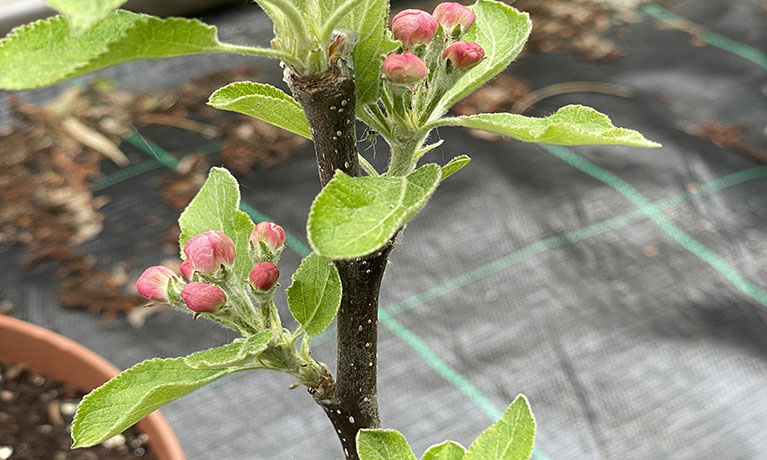Search
50-year-old find at abandoned allotments sees Coventry University researchers create community tree nursery

Wednesday 19 July 2023
Press contact
An unexpected discovery at an abandoned allotment in Coventry has led to a project looking to preserve the city’s trees.
Coventry University researchers Liz Trenchard and Sam Green came across apple blossom growing at the abandoned allotment site while walking around Charterhouse Park. They believe the trees could be at least 50 years old.
Liz, an assistant professor, and Sam, a research assistant from Coventry University’s Centre for Agroecology, Water and Resilience (CAWR), were searching for somewhere to site a community tree nursery after applying for funding from the Forestry Commission Tree Production Innovation Fund for their Growing Connections project on Community Tree Nursery research.
Now they have launched the pilot project focusing on preserving heritage apple trees.
There are a number of interesting local Warwickshire varieties including the Wyken Pippin and it is likely that the veteran apple trees at the Charterhouse site are older, heritage varieties. Many are over 50 years old.
According to the local community, the allotments have not been cultivated for many years. We think that they were first created in the 1930s just before the Second World War, but then later abandoned in the 1980s, when the allotments kind of fell out of fashion.
Liz Trenchard, Assistant Professor Research, Centre for Agroecology, Water and Resilience
Liz and Sam mapped the veteran apple trees and sent off samples for variety identification. They are now working to develop the project further and are applying for funding to take a community-based approach to locate and preserve heritage apple varieties found throughout Coventry.
It is difficult to preserve heritage varieties by collecting apple seeds. A better approach is to collect scions (a young shoot or twig of a plant) and graft these onto rootstock and grow the saplings in pots before planting. This is labour intensive and time consuming and finding and preserving local genetic resources of these local apple trees is best achieved with a community-based approach.
Sam Green, research assistant, Centre for Agroecology, Water and Resilience
As well as the apple tree project, Liz and Sam are still working on their Growing Connections project and focusing on community tree nurseries as an alternative way of producing trees compared to much bigger commercial nurseries.
The benefits of community tree nurseries are that they gather seeds or tree material locally, grow the trees locally and distribute trees locally which reduces the incidence of diseases as we’re not bringing in trees from overseas.
Liz Trenchard
The aim is to set up a community-run tree nursery in Coventry to provide local provenance trees and propagation of locally important trees and tree species for planting projects in the city.
Liz and Sam were also recently awarded a further £1,500 from a Social Impact Challenge Fund for a pilot Coventry University Community Tree Nursery after a ‘Dragon’s Den’ pitching event organised by Coventry University Social Enterprises (CUSE).




